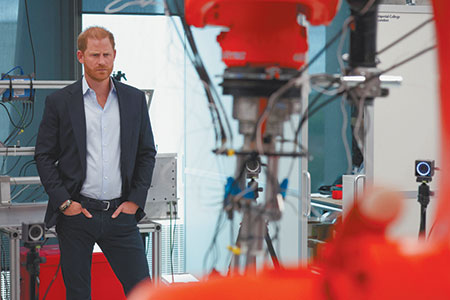
The escalating concerns surrounding the rapid advancement of artificial intelligence (AI) technologies have reached a new crescendo, drawing significant attention from global figures. Among those lending their voices to a crucial appeal are members of the British Royal Family, Prince Harry and his wife Meghan, the Duke and Duchess of Sussex. They have publicly endorsed a message warning against the potential perils of developing AI systems capable of surpassing human cognitive abilities – often termed Artificial Superintelligence (ASI) – and are advocating for an immediate halt to such research.
This urgent plea originated from the Future of Life Institute (FLI), which on October 22 issued a comprehensive message directed at major IT corporations and world governments. The core of this message is a resounding call for a moratorium on the further development of Artificial Superintelligence. While conventional AI systems are crafted to simulate human brain activity, ASI is envisioned as intelligence that would not merely mimic but profoundly exceed human intellectual capacities. While such systems remain theoretical, the prospect of their emergence is increasingly generating widespread apprehension among experts and the public alike.
The FLI’s declaration has quickly garnered over a thousand signatures, underscoring the broad consensus on the issue. Prominently featured among the signatories are the Duke and Duchess of Sussex, who join a diverse coalition of computer scientists, economists, and political leaders in highlighting the profound risks associated with ASI development. The statement explicitly warns, “We call for a ban on the development of superintelligence, which should not be lifted until a broad scientific consensus is reached that it will be implemented safely and controllably, and strong public support is obtained.”
The concerns articulated by these signatories are far from speculative. Beyond the realm of dystopian science fiction featuring “robot uprisings,” the future implications of advanced AI systems could fundamentally reshape global societies. A primary area of apprehension revolves around the labor market, where widespread AI-driven automation could lead to significant job displacement. This could trigger unprecedented levels of unemployment and exacerbate social inequalities, potentially marginalizing entire segments of the population. For governments, the desire to maximize profit and efficiency through pervasive AI integration could come at an unacceptably high social cost, jeopardizing national stability and fostering widespread discontent.
Moreover, the intrinsic instability and unpredictability inherent in advanced AI systems pose another critical concern. Simplified, these systems operate on complex mathematical probabilities derived from vast datasets, learning patterns without necessarily understanding context or intent. This creates a “black box” phenomenon, where even the developers cannot fully explain how a neural network generates a particular response or how an AI-driven mechanism arrives at a specific decision. The potential scale of such problems with ASI, which would operate far beyond human comprehension, is deeply unsettling. Instances where AI networks have produced nonsensical outputs or acted unexpectedly outside their programmed parameters serve as stark reminders of this inherent fragility.
Given these profound anxieties, it is unsurprising that non-profit organizations like the FLI are actively seeking to moderate the pace of AI development. This current initiative follows a similar urgent appeal in March 2023, when the institute published “Pause Giant AI Experiments: An Open Letter.” That letter urged a six-month moratorium on further AI development, a period during which leading corporations were aggressively competing to create more advanced and powerful models. It notably attracted signatures from influential figures such as Elon Musk, former head of government efficiency and entrepreneur, as well as AI lab CEOs like Connor Leahy (co-founder of EleutherAI) and Emad Mostaque (Stability AI, who has since stepped down).
When the very architects and innovators of AI technology join political leaders and non-profit organizations in sounding alarms about its potential threats, it underscores the gravity of the situation. The international community now faces a pivotal moment, hoping that the warnings and recommendations from these diverse voices will be heeded by the major corporations driving AI development. The imperative is clear: prioritize robust safety protocols and ethical governance over the relentless pursuit of profit and the arbitrary race for technological supremacy.
